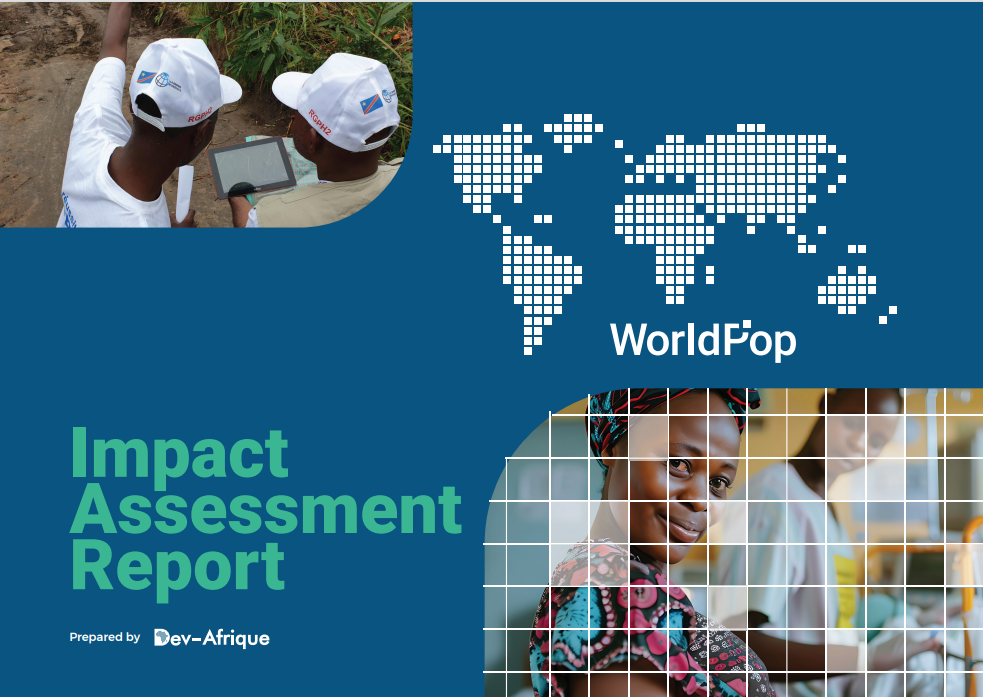WorldPop’s Global Impact Highlighted in New Report by Dev-Afrique
For the last 11 years, WorldPop has been providing open-access, high-resolution population estimates, which equip researchers, governments, international organisations, and NGOs with critical data to target interventions and drive sustainable development. Through innovative methods and tools for demographic modelling, WorldPop bridges gaps in the availability, quality and accessibility of population data.
A newly released impact assessment report by Dev-Afrique Development Advisors underscores the critical role WorldPop has played in advancing these data-driven development efforts worldwide. The report, supported by the Bill and Melinda Gates Foundation, reveals how WorldPop’s open-access population data and technical expertise have shaped development programming across multiple sectors, including health, education, and disaster response.
It explores ways in which WorldPop’s high-resolution population estimates have empowered governments, humanitarian organisations, and development agencies to better target interventions, expand access to essential services, and improve decision-making.
The report commends WorldPop’s development approach of partnering with national and international organisations, enabling them to produce and use population data to achieve their strategic objectives. These collaborations, which include training and capacity-strengthening initiatives, are set up to ensure ownership and sustainability of the demographic data and modelling methods. They have improved the outcomes of interventions by these institutions in various contexts, from malaria prevention and vaccination campaigns, to disaster relief efforts.
Key Findings of the Report
The impact assessment conducted by Dev-Afrique captures the perspectives of more than 40 WorldPop partners and data users. In addition to its impact on the academic research sphere, the report identifies three core areas where WorldPop’s data has made significant contributions:
- Improving access to interventions: Through its portfolio of research and development projects, WorldPop continues to produce accurate, reliable data that has been used to distribute essential services and supplies to the most vulnerable populations. In Nigeria, for example, local teams used WorldPop’s population estimates to identify areas with low vaccination rates, increasing vaccine coverage in 67 regions
- Strengthening population modelling capacity: WorldPop partners with national statistical offices in countries such as Ghana, Papua New Guinea, and Democratic Republic of the Congo, helping them build their capacity for production of small area population estimates and data-driven decision-making.
- Accelerating progress for social impact: Collaborations with organizations like Facebook/Meta’s Data for Good initiative have resulted in provision of essential services, including shelter and clean water, to over 870,000 people in Nairobi and Northern Ghana.
A Call for Continued Innovation and Partnerships
As demand for reliable population data continues to grow, the report outlines recommendations for further developing WorldPop’s products and services. These include expanding capacity-strengthening initiatives for non-technical users, providing multilingual support, and establishing long-term partnerships to sustain and scale the use of WorldPop data.
WorldPop will continue to innovate and build on its successes to meet the growing demands for accurate, reliable population data at small area scales.
This report is just a snapshot of our impact and we’re keen to learn about other uses of our data. If you have an existing development application that has made use of WorldPop data, then please contact us and share it.
We’re trialling the ‘Deep Dive’ audio summary feature of Google’s NotebookLM. This feature uses AI to create a podcast-like audio conversation between two AI-derived hosts that summarise key points of a document - in this case the Disappearing People article in Science.
As Google acknowledge that NotebookLM outputs may contain errors, we have been careful to check, edit and validate this audio.
Please contact us to let us know what you think.
Music: My Guitar, Lowtone Music, Free Music Archive (CC BY-NC-ND)
References
- A subnational reproductive, maternal, newborn, child, and adolescent health and development atlas of India. (Nature [Scientific data])
- Child and Maternal Heath Progress Map (India)
- Comparing lagged impacts of mobility changes and environmental factors on COVID-19 waves in rural and urban India (PLoS Global Public Health)
- Access Our New Global Population Data – 2015 to 2030
- FuturePop: Constructing high spatial resolution population projections and supporting the provision, access and updates of WorldPop spatial demographic datasets



